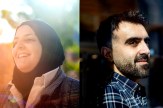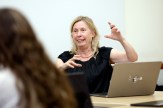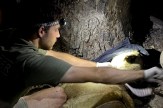‘The best front-end engineer samurai there ever was’: Dispatches from the hackers of our future

Last month, Wired magazine told the story of seven computer science-obsessed friends in Stetson West who call themselves the “Sthacks,” short for “Stetson Hacks.” The group, Wired wrote, represented one small slice of a “generation of makers and breakers” who will help “shape the future.” Two other Northeastern students—Danielle Nguyen and Niousha Jafari—were also mentioned in the piece. Here, we share more of their stories.
The best front-end engineer samurai there ever was
In a single breath of excitement, Danielle Nguyen, CIS’19, said she wants to be “the best front-end engineer samurai there ever was.”
“I want to become really, really good at my job.”
Nguyen’s answer reflects the lighthearted practicality that’s at the root of everything she does. In fact, even her foray into computer science was built on a sense of pragmatism. Or, as Nguyen explained, “I was just really jaded in high school.”
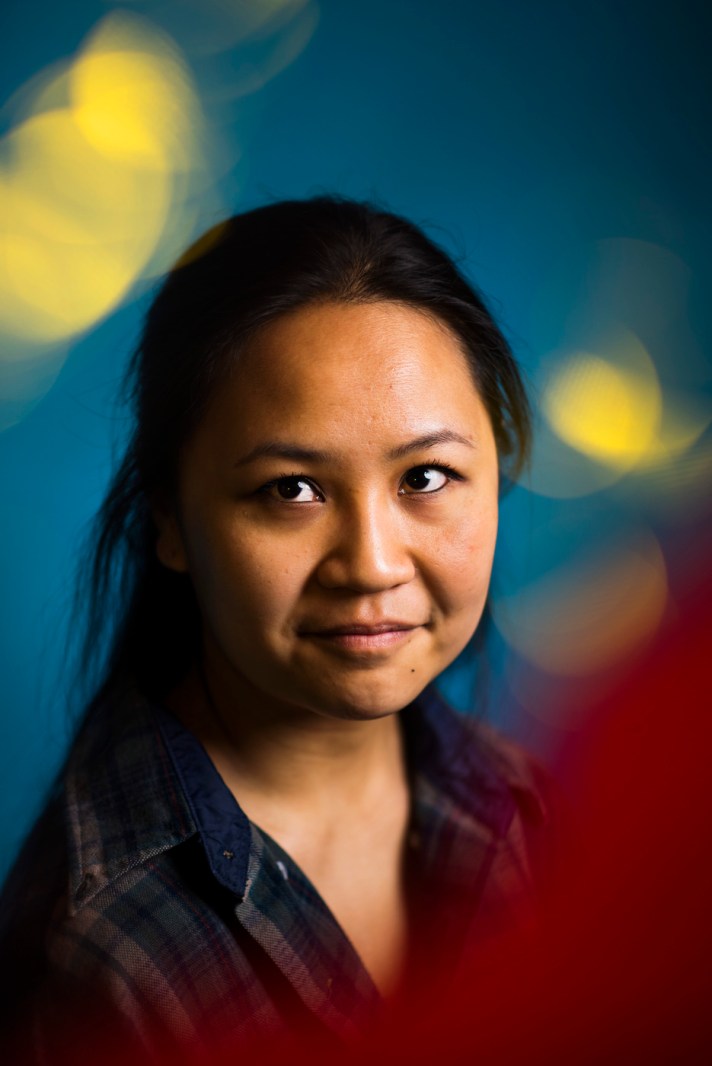
Danielle Nguyen, CIS’19, is president of NU Hacks. Photo by Adam Glanzman/Northeastern University
Growing up in a low-income family in San Diego, Nguyen said making money was an ever-present consideration. So, as she went through high school, she paid close attention to the highest-paying job fields listed on a bulletin board in her guidance councilor’s office.
“It was all software engineers. So, I took an online tutorial where I learned Python and actually liked it,” she said, referring to the programming language. “It almost looked like an alien language, which was romantic to me in a way.”
Learning about computer science and software engineering became something Nguyen could do on her own time on her family’s home computer. This was essential because her school was light on computer science courses, Nguyen said.
“I liked that it was methodical, and if you didn’t understand it, you could find some explanation that made sense to you,” she said. “It’s not like English, where it feels like, ‘It’s done this way because: reasons.’”
Going above and beyond
Around the same time, Niousha Jafari, CIS’19, was exploring her own “alien language” 6,000 miles away.
Iran-born and Czech Republic-raised, Jafari said she had always wanted to be an inventor. And, as she put it, computer science “is as close as I can get.”
In her international high school, computer science classes were among the few courses where Jafari “didn’t mind going above and beyond with my homework, even when I knew it wasn’t going to affect my grade.”
She, too, got hooked on puzzling through complex algorithms.
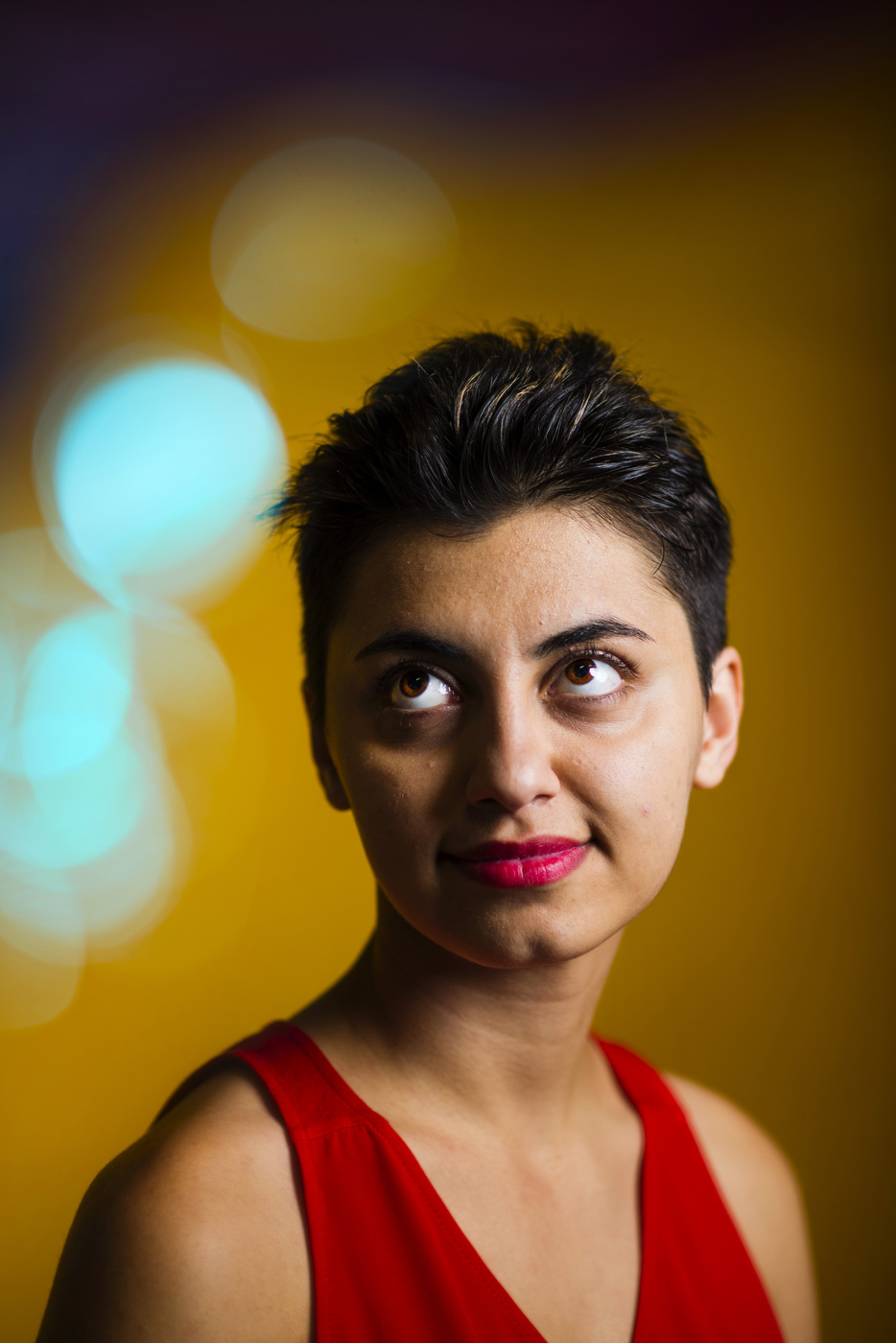
Niousha Jafari, CIS’19, hopes to create an app that will help connect refugees with services. Photo by Adam Glanzman/Northeastern University
“When you write a program, or do anything with computer science, you can interact with it,” Jafari said. “That’s very unique to CS. There aren’t that many other fields where you can do your homework and then play with your homework.”
Both Nguyen and Jafari are members of NU Hacks, a student organization dedicated to “making, breaking, hacking, designing, and other creative-type things,” according to the group’s website. In fact, Nguyen is its president; she took office right after Jafari stepped down to study abroad.
Jafari and Nguyen described the group warmly, noting that they’ve met some of their best friends in NU Hacks. Still, in the club and in the workforce, they are two women in a male-dominated field, a fact that Jafari said sometimes poses unexpected challenges. One such challenge, she said, is the concern that her employment and her work achievements are based on achieving greater diversity in the field, rather than based on merit, as they should be.
“I think you end up constantly questioning your accomplishments,” she said. “I feel sometimes like I’m fighting to get my ideas heard or validated in some of these spaces.” It’s something she hopes will continue to change for the better.
It’s that puzzle feeling
Rather than some nefarious, deep-web meddling, hacking, to Nguyen, Jafari, and the group’s other members, NU Hacks is just as the description reads.
“It’s tinkering,” Nguyen said. “It’s making something.”
Jafari said, “Hacking is one of the best things ever. It couldn’t be further from the typical stereotype. Hacking is building something, but you build it in a brand-new way; it’s solving a problem in a way that no one else has before.”
That’s what they love about it—the innovation, the creativity, the enterprising spirit inherent in hacking.
“It’s taking this problem we currently have, and you get to be the first one who solves this problem,” Jafari said. “In computer science, you have to invent. It’s that puzzle feeling.”
It’s about making people’s lives better
Both students are putting that puzzle-solving to the test on co-op at software development companies, where Nguyen and Jafari are working to use their skills for good.
For Jafari, that means joining a company that “at least doesn’t do anything negative for the world,” she said. “It has to meet at least that bar.” Her co-op at the Boston branch of Runkeeper, a company that developed fitness tracking software and an accompanying application, meets that bar and more.
“It’s not all about being a money-making machine; it’s about making people’s lives better,” Jafari said.
It’s taking this problem we currently have, and you get to be the first one who solves this problem. In computer science, you have to invent. It’s that puzzle feeling.
Niousha Jafari
CIS'19
Likewise for Kinto Care, the small startup at which Nguyen works. The Cambridge, Massachusetts-based company has created an application to organize and support those looking after an aging parent or partner. But, Nguyen said, it could be used to look after anyone.
“When I was little, my mom was basically a single mother,” she said. “We didn’t always have enough money to cover medical expenses, so in certain scenarios she would supplement with traditional Asian herbal home remedies and I would be out in the schoolyard during recess picking dandelion leaves to steep in teas or grinding mung bean powder. Having this app would have really helped.”
The last line of defense
Perhaps this social consciousness stems from growing up in an era where examples of the evils of hacking are readily available, but both Jafari and Nguyen are determined to use hacking for good.
“Computer science is the last line of defense against bad things,” Nguyen said. “I would prefer to be in a position to make those kinds of decisions because I trust myself to be ethical.”
Jafari has been puzzling over how to harness her hacking skills to help refugees, among the most vulnerable among us.
“There’s a lot of social networking out there—a lot of connecting people to restaurants, or connecting friends on social media, for example—but not a lot of connecting people to refugees,” she said. The gap here, she noted, is in connecting those who might not have the means to find these services on their own, with those who want to help but aren’t sure how.
“Let’s say you’re a teacher who wants to help a refugee learn English, or a yoga teacher who wants to donate your time and your studio, my idea is to create a platform both for people who want to help and for those who need it.”
Jafari paused while describing her idea, wondering out loud if she shouldn’t keep it under wraps until she could secure the rights to it. Just as quickly, though, she decided, “The worst thing that can happen here is someone does it sooner and better than me, which is also the best thing that can happen.”
